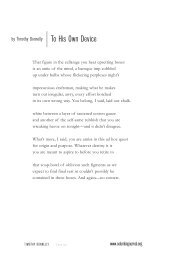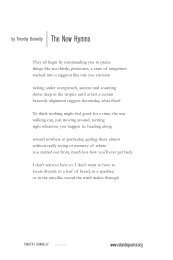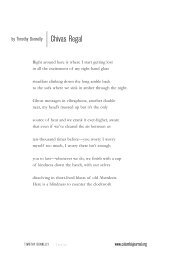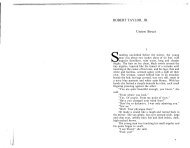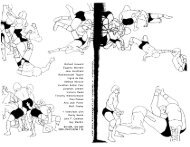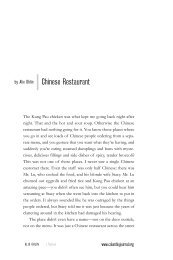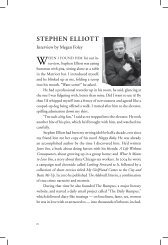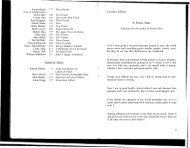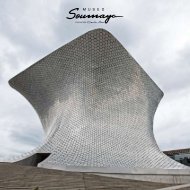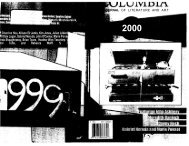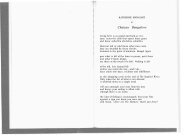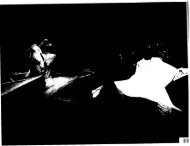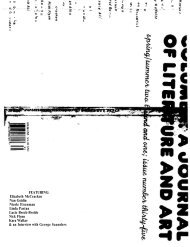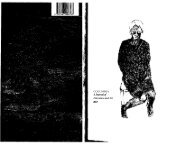Issue 27 - Columbia: A Journal of Literature and Art
Issue 27 - Columbia: A Journal of Literature and Art
Issue 27 - Columbia: A Journal of Literature and Art
Create successful ePaper yourself
Turn your PDF publications into a flip-book with our unique Google optimized e-Paper software.
126<br />
city. Compared to the rest <strong>of</strong> the country, he said, East Berlin<br />
was paradise.<br />
Reluctantly, Karl nodded. "It's true," he said. "Here you see<br />
only the chocolate."<br />
Then, as if sensing he'd gone as far as he could go, Karl abruptly<br />
drained his beer <strong>and</strong> stood up, reminding us that he had to work<br />
in the morning. He shook my h<strong>and</strong> <strong>and</strong> nodded curtly to Klaus.<br />
v.<br />
Ever since I'd sat down, Klaus <strong>and</strong> I had been sharing episodes<br />
<strong>of</strong> strangely intense eye contact. Now that we were alone he really<br />
opened up, as though we'd already achieved some degree <strong>of</strong><br />
intimacy.<br />
"GDR 15 good," he told me. "But only if you don't think. If<br />
you start thinking, then it's very bad."<br />
"At least East Berlin is better than the rest <strong>of</strong> the country," I<br />
said, putting my new knowledge to quick use.<br />
Klaus nodded thoughtfully. "You can live good here," he conceded.<br />
"But a pig also lives good <strong>and</strong> then—" He karate-chopped<br />
the tabletop, as though his h<strong>and</strong> were the blade <strong>of</strong> a butcher's ax.<br />
Some men in a nearby booth turned to look.<br />
Klaus lowered his voice. "You can go anywhere you want," he<br />
reminded me. "I can't even go to Hungary on vacation."<br />
When I asked why, he told me he'd been jailed for a year <strong>and</strong> a<br />
half in the late Sixties, back when he was only a few years older than<br />
I was now. He said he'd spent three months in solitary confinement.<br />
"It wasn't so bad. When you're alone you have time to think."<br />
He spun his finger in a circular motion near his temple. He said<br />
he knew better than his captors, because he believed in the<br />
freedom <strong>of</strong> the individual conscience. "No man can know what's<br />
right for another man," he declared fiercely, as if daring me to<br />
disagree.<br />
All I could do was nod. We had downed several beers at that<br />
point, <strong>and</strong> my incipient buzz was compounded by a feeling very<br />
close to awe. Here I was behind the Wall, behind the Iron frigging<br />
Curtain, drinking beer with a dissident, a man who had been jailed<br />
for his beliefs.<br />
Klaus went on to say that he'd lost his job as an engineer as a<br />
result <strong>of</strong> his troubles, <strong>and</strong>^ that now he worked for the Lutheran<br />
Church. For the most part the authorities left him alone, but they<br />
still wouldn't let him go to Hungary. They wouldn't let him go<br />
anywhere. He gazed at the table for a while, then looked up. His<br />
eyes were moist <strong>and</strong> sorrowful.<br />
"Come back next week," he told me. "I'll show you around<br />
the city. Places you'd never see on your own."<br />
Honored <strong>and</strong> excited by the invitation, I wrote Dr. G.'s phone<br />
number on a beer coaster <strong>and</strong> slid it across the table.<br />
VI.<br />
I believed him.<br />
I let myself believe that I had w<strong>and</strong>ered into a bar full <strong>of</strong> uniformed<br />
police <strong>of</strong>ficers in one <strong>of</strong> the world's most repressive police<br />
states, <strong>and</strong> simply bumped into a dissident, a brave man who was<br />
willing to speak his mind in a public place to a stranger—an<br />
American, no less—even going so far as to liken his fellow citizens<br />
to pigs being fattened for the slaughter.<br />
In my defense, I can at least point out that I was troubled by<br />
the encounter. My journal contains the following entry, written<br />
through a mild hangover on the morning after my visit:<br />
. . .as I headed back to the West, I began to wonder if I should<br />
return when Klaus calls. Here I was, doing just what I'd hoped<br />
when I came here, <strong>and</strong> it scared me. My typically western<br />
suspicions began to appear. Was he gay? (After all, he had<br />
touched me several times during our conversation.) Would he<br />
get me into trouble for spying?<br />
Despite these concerns, it didn't take much effort for me to<br />
dismiss "my typically western suspicions." Klaus had seemed sincere<br />
to me, if a bit reckless. And so what if he was gay? What did<br />
that have to do with anything? As for the second question, it<br />
seemed to me the height <strong>of</strong> paranoia to imagine that the Stasi, the<br />
dreaded East German Secret Police, would waste time on me. I<br />
was just a college kid. I didn't know any military secrets or harbor<br />
any subversive designs against the East German state. I hadn't<br />
even voted for Reagan.



